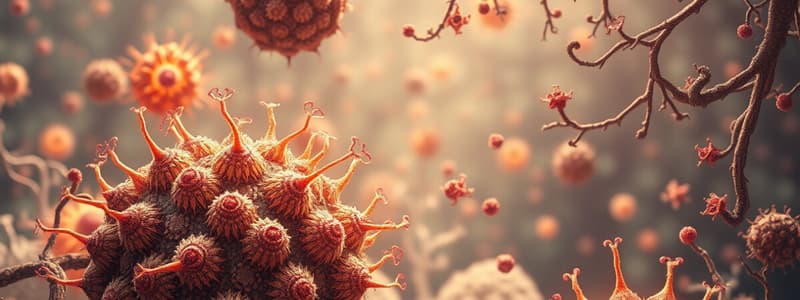Podcast
Questions and Answers
Define protobionts.
Define protobionts.
Protobionts are systems that are considered to have possibly been the precursors to prokaryotic cells, exhibiting properties associated with life.
Define protocell.
Define protocell.
Protocells are the cells that came before the first living cells, lacking the full biochemical repertoire, but helped form the first living cells.
What is the endosymbiotic theory?
What is the endosymbiotic theory?
The endosymbiotic theory states that mitochondria and chloroplasts in modern cells originated from free-living bacteria that were engulfed by another bacterial cell.
Define prokaryotic cell.
Define prokaryotic cell.
Signup and view all the answers
Define eukaryotic cell.
Define eukaryotic cell.
Signup and view all the answers
What are the 5 mass extinctions?
What are the 5 mass extinctions?
Signup and view all the answers
Study Notes
Protobionts
- Protobionts are potential precursors to prokaryotic cells.
- Composed of abiotically produced organic molecules encased in a membrane-like structure.
- Exhibit properties associated with life, including metabolism, reproduction, and excitability.
- Maintain an internal chemical environment distinct from surrounding conditions.
- Considered a significant step in the origin of life on Earth.
Protocells
- Protocells preceded the first living cells.
- Lacked a complete biochemical repertoire compared to modern cells.
- Contributed to the emergence of the first living cells through combination, replication, and symbiosis.
Endosymbiotic Theory
- Proposes that mitochondria and chloroplasts in eukaryotic cells were once free-living bacteria.
- These bacteria were engulfed by another bacterial cell, leading to the evolution of eukaryotic cells.
Prokaryotic Cells
- Characterized as small cells without membrane-bound organelles.
- Lack a nucleus, but still contain DNA.
- Bacterial cells serve as a primary example of prokaryotic cells.
Eukaryotic Cells
- Defined by the presence of a membrane-enclosed nucleus and organelles.
- Found in organisms such as protists, plants, fungi, and animals.
Five Mass Extinctions
- Late Ordovician
- Devonian
- End of the Permian
- Late Triassic
- End of the Cretaceous
Studying That Suits You
Use AI to generate personalized quizzes and flashcards to suit your learning preferences.
Description
Test your knowledge on the origins of life with this quiz covering protobionts, protocells, and the endosymbiotic theory. Understand the fundamental concepts of prokaryotic cells and how they relate to the evolution of more complex life forms. Explore the significant steps in the emergence of living cells and their characteristics.

